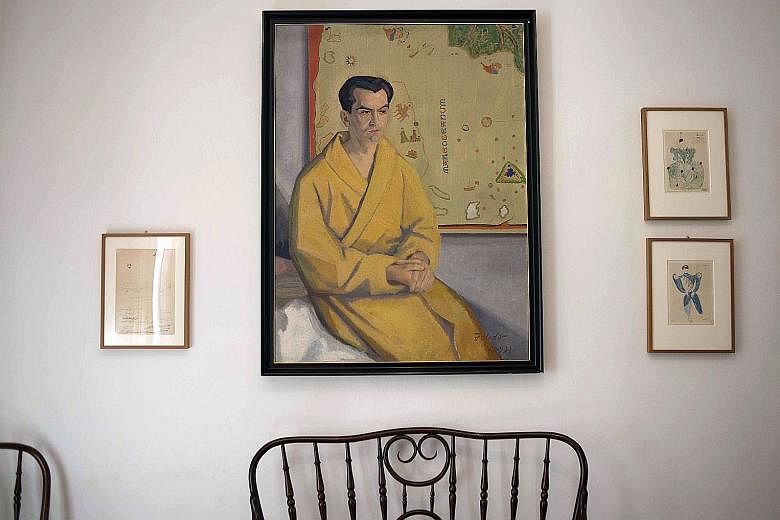GRANADA, SPAIN • The legacy of Federico Garcia Lorca's hostilities with government lives on these days through his family, whose members are tangling with officials over control of a new US$25-million (S$33.6-million) centre built to honour him, the playwright and poet who was executed by firing squad during the Spanish Civil War.
Opened in this historic city last summer, the centre was supposed to house an enormous archive of nearly 20,000 items - manuscripts, drawings, musical compositions and artworks valued at more than €20 million (S$30 million) - to be preserved in a huge steel strongbox suspended within a white tower of concrete.
But today, that earthquake-proof container hangs empty.
The poet's family and its Garcia Lorca Foundation, which owns the archives, have refused to move the archives to the new centre from storage in Madrid until they are given what they said was promised power from local government officials over the direction and programming of the centre.
Ms Laura Garcia Lorca, the writer's niece, who leads the foundation, said: "From the start, there was never an enthusiastic approach to this project from government institutions."
She was born in New York while her family lived there in exile after her uncle was gunned down by nationalist forces 80 years ago, in August 1936.
The centre, which opened last summer in reduced form, was expected to add an international literary attraction in the heart of Granada, near its Renaissance cathedral.
Government officials have plans to organise a special tourist route leading to all the landmarks in the writer's life that spread through his native Andalusia. On the route, within walking distance of the centre, is Garcia Lorca's summer home, where he wrote Blood Wedding - a classic 1932 play about love, murder and greed - at a bare wooden desk.
But today, the centre is embroiled in a drama worthy of a Garcia Lorca work, with accusations of corruption.
It lacks a director. Without the archive, officials have cancelled plans for almost a year of events, featuring international writers, poets and artists including Patti Smith, which had been scheduled to coincide with the opening last July.
A former adviser to the foundation is facing trial on charges of forgery and embezzlement relating to the loss of more than €2.5 million from a construction loan for the building.
Last April, the Spanish Culture Ministry put special protection on the archive, effectively barring the sale of any part of the trove abroad.
Officials said they feared parts could be sold off to resolve the centre's financial problems, though family members have insisted they have no intention of breaking up the writer's oeuvre.
The new mayor of Granada, Mr Francisco Cuenca, is seeking an arrangement that would settle disagreements between the foundation and certain regional and national government institutions that make up the consortium overseeing the centre and that are supposed to contribute to its funding.
The conflict has been apparent for decades.
Garcia Lorca is buried somewhere on the outskirts of Granada in the field where he was executed at age 38, yet no one is clear just where.
Archaeologists and researchers are seeking for a third time to locate the grave, against the wishes of family members, who include six nieces and nephews.
A 1965 police report that surfaced last year revealed that the writer was shot on orders of military authorities who scorned him, according to the document, for being a homosexual and a Freemason.
In this Andalusian city of 236,000 people, Ms Garcia Lorca said: "He still brings up conflicted feelings and it may have to do with guilt about shared responsibility for what happened."
For decades, the portraits of past mayors that fill City Hall here did not include a portrait of the poet's brother-in-law, a socialist executed by nationalists in 1936, just a few days after his election.
But this summer, Mr Cuenca - a Socialist who replaced a conservative mayor who had feuded with the writer's family - ordered that the portrait be put on prominent display.
He said he hoped to open the centre with the archives and new events this year to bolster tourism.
"Garcia Lorca is the best brand for Granada," he said while walking through his city's historic quarter. "Tourists everywhere know Granada for the Alhambra, but this is a city of poets and creativity."
Now the foundation has reached a tentative agreement with its bank, La Caixa, which is willing to forgive the foundation's construction loan, according to Mr Matias Cortes, the foundation's lawyer and a board member.
In return, he said, the bank will become a chief sponsor of the centre, but he added that a new agreement on the governing structure of the centre and the foundation's role is still being negotiated.
He expects that with an accord this month, the archives could move to Granada by the end of the year.
NEW YORK TIMES

